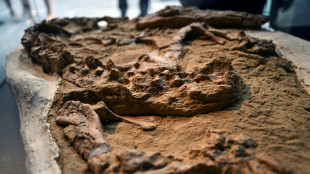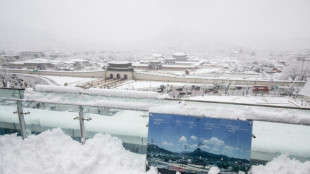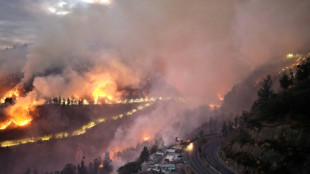
-
 LIV Golf's Herbert in charge at Australian Open, Smith two back
LIV Golf's Herbert in charge at Australian Open, Smith two back
-
Despair in Sweden as gangs recruit kids as contract killers

-
 Russia launches massive aerial attack on Ukraine's energy sector
Russia launches massive aerial attack on Ukraine's energy sector
-
Peru scientists unveil crocodile fossil up to 12 million years old

-
 At plastic treaty talks, no united front for industry
At plastic treaty talks, no united front for industry
-
Williamson falls for 93 as England fight back in first Test

-
 South Korea officials say three dead in heavy snowfall
South Korea officials say three dead in heavy snowfall
-
High-flying Fiorentina face test of Scudetto credentials with Inter visit

-
 Verstappen switches focus to re-boot defence of F1 teams' title
Verstappen switches focus to re-boot defence of F1 teams' title
-
UK filmmaker Richard Curtis makes first foray into animation

-
 Countrywide air alert in Ukraine due to missile threat
Countrywide air alert in Ukraine due to missile threat
-
China's military corruption crackdown explained

-
 Primark boss defends practices as budget fashion brand eyes expansion
Primark boss defends practices as budget fashion brand eyes expansion
-
Williamson eyes ton as New Zealand take control against England

-
 Norway faces WWF in court over deep sea mining
Norway faces WWF in court over deep sea mining
-
Trump, Sheinbaum discuss migration in Mexico amid tariff threat

-
 Asian markets mixed after subdued pre-holiday shift on Wall St
Asian markets mixed after subdued pre-holiday shift on Wall St
-
Orban's soft power shines as Hungary hosts Israeli match

-
 'Retaliate': Trump tariff talk spurs global jitters, preparations
'Retaliate': Trump tariff talk spurs global jitters, preparations
-
'Anti-woke' Americans hail death of DEI as another domino topples

-
 Trump hails migration talks with Mexico president
Trump hails migration talks with Mexico president
-
Truckers strike accusing Wagner of driver death in Central African Republic

-
 London police say 90 victims identified in new Al-Fayed probe
London police say 90 victims identified in new Al-Fayed probe
-
Air pollution from fires linked to 1.5 million deaths a year

-
 Latham falls for 47 as New Zealand 104-2 in first England Test
Latham falls for 47 as New Zealand 104-2 in first England Test
-
US tells Ukraine to lower conscription age to 18

-
 Judge denies Sean Combs bail: court order
Judge denies Sean Combs bail: court order
-
Suarez extends Inter Miami stay with new deal

-
 Perfect Liverpool on top of Champions League, Dortmund also among winners
Perfect Liverpool on top of Champions League, Dortmund also among winners
-
Liverpool more 'up for it' than beaten Madrid, concedes Bellingham

-
 Aston Villa denied late winner against Juventus
Aston Villa denied late winner against Juventus
-
Mexico president hails 'excellent' Trump talks after US tariff threat

-
 Leicester set to appoint Van Nistelrooy - reports
Leicester set to appoint Van Nistelrooy - reports
-
Coffee price heats up on tight Brazil crop fears

-
 Maeda salvages Celtic draw against Club Brugge
Maeda salvages Celtic draw against Club Brugge
-
Villa denied late winner against Juventus

-
 Dortmund beat Zagreb to climb into Champions League top four
Dortmund beat Zagreb to climb into Champions League top four
-
Mbappe misses penalty as Liverpool exact revenge on Real Madrid

-
 Brazil's top court takes on regulation of social media
Brazil's top court takes on regulation of social media
-
Thousands still queuing to vote after Namibia polls close

-
 Trump taps retired general for key Ukraine conflict role
Trump taps retired general for key Ukraine conflict role
-
Canadian fund drops bid for Spanish pharma firm Grifols

-
 Argentine ex-president Fernandez gives statement in corruption case
Argentine ex-president Fernandez gives statement in corruption case
-
Mexico says Trump tariffs would cost 400,000 US jobs

-
 Car-centric Saudi to open first part of Riyadh Metro
Car-centric Saudi to open first part of Riyadh Metro
-
Brussels, not Paris, will decide EU-Mercosur trade deal: Lula

-
 Faeces, vomit offer clues to how dinosaurs rose to rule Earth
Faeces, vomit offer clues to how dinosaurs rose to rule Earth
-
Ruby slippers from 'The Wizard of Oz' up for auction

-
 Spain factory explosion kills three, injures seven
Spain factory explosion kills three, injures seven
-
US Fed's favored inflation gauge ticks up in October


Israel short on soldiers after year of war
More than a year into the Gaza war, the Israeli army's reservists are exhausted and it is struggling to recruit soldiers just as it opens a new front in Lebanon.
Some 300,000 reservists have been called up since the Hamas attack of October 7, 2023, according to the army, 18 percent of them men over 40 who should have been exempted.
Military service is mandatory from the age of 18 for Israeli men and women, though several exemptions apply.
Israel is waging a multi-front war against Hamas in Gaza and Iran-backed militant group Hezbollah in Lebanon.
Since the military launched its ground offensive in Gaza on October 27 last year, it has lost 367 soldiers in the campaign, while 37 have died in Lebanon since Israel began ground operations there on September 30.
Periods of reserve duty have been extended, and some reservists complain they are unable to go on with their normal lives for up to six straight months.
"We're drowning," said reservist Ariel Seri-Levy in a social media post shared thousands of times.
He said he had been called up four times since the October 7 attack, and called out those who want Israel to "stay in Lebanon and Gaza".
"We have to end this war because we are out of soldiers," he said, adding that while he still believed in serving one's country, "the concessions have become too great".
Another reservist and father of two told AFP under condition of anonymity that "to fatigue and moral exhaustion is added the fact that I lost my job".
Many freelance workers have had to close shop because of the war, even if the government guarantees a minimum income for reservists.
"The collective is still above the individual but the cost is too great for my family," the reservist said, adding that he spent nearly six months in Gaza this year.
- Ultra-Orthodox exemptions -
The ongoing war has inflamed the public debate on drafting ultra-Orthodox Jews, many of whom are exempted from military service.
The ultra-Orthodox account for 14 percent of Israel's Jewish population, according to the Israel Democracy Institute (IDI), representing about 1.3 million people. About 66,000 of those of conscription age are exempted, according to the army.
Under a rule adopted at Israel's creation in 1948, when it applied to only 400 people, the ultra-Orthodox have historically been exempted from military service if they dedicate themselves to the study of sacred Jewish texts.
In June, Israel's Supreme Court ordered the draft of yeshiva (seminary) students after deciding the government could not keep up the exemption "without an adequate legal framework".
Ultra-Orthodox political parties in Prime Minister Benjamin Netanyahu's coalition called for such a framework before a vote on the budget at the end of the year.
Aryeh Deri, leader of the Sephardi ultra-Orthodox party Shas, said he hoped "to solve the problem of the draft" for seminary students.
- 'Lighten the load' -
Some 2,000 wives of reservists from the religious Zionist movement, which combines religious lifestyle with army participation, signed an open letter asking to "lighten the load for those who serve".
"There is no contradiction between Torah study and military service, both go hand in hand," academic Tehila Elitzur, mother and wife of a reservist, told the Yediot Aharonot newspaper.
Six men who had volunteered despite being eligible for exemptions were killed in combat between October 22 and 28, including a father of 10.
David Zenou, a 52-year-old rabbi who fought for 250 days this year, including several weeks in Lebanon, said: "It's an honour to serve my country, and I will continue to do it for as long as I can.
"Above all, let's not forget that this is war and we are short on soldiers," the father of seven and grandfather of six told AFP.
L.Janezki--BTB
